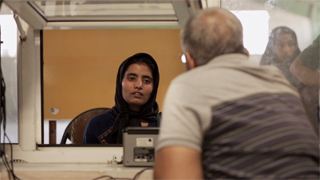Exodus
 IRAN / 2019 / Persian / Color, B&W / Digital File / 80 min
IRAN / 2019 / Persian / Color, B&W / Digital File / 80 min
Director, Script, Editing, Producer: Bahman Kiarostami
Photography: Davood Maleki
Sound: Ali Alavi
World Sales: Documentary and Experimental Film Center (DEFC)
www.defc.ir
Economic sanctions have caused the Iranian currency to plummet in value. Undocumented Afghan immigrants who had been tacitly allowed to stay as a cheap labor source have lost their motivation to work under such dangerous and unfair conditions, and crowd to the repatriation center. Conversations between officers and border-crossers touch on topics that include work, family and religion, sounding at times like the cruel questioning of an inquisitor, and at times like an intimate chat. The story of a major exodus in the age of global capitalism, to the rhythm of Bob Marley’s “Exodus.”
[Director’s Statement] In 2017 President Trump launched new sanctions on Iran, which pushed us into an economic crisis, and gave me the idea for Exodus. When the value of the Iranian Rial plunged, Afghan workers started leaving the country. Any Afghan who leaves of their own free will is processed on departure at the Camp of Imam Reza, off a dusty highway to the East of Tehran. I had driven past the place, but when I finally made it inside, it was nothing like the camp I had expected, nor were the conversations that pass between illegal immigrants and their Interior Ministry Officers.
These are delicate, witty exchanges, laced with stark honesty and lies. An undocumented worker can be anyone he likes in an Immigration Officer’s booth, and the officer is free to ask about engagements, suicide bombers, headscarves or the take home pay of a goatherd.
For me, over every booth hangs a simple question: “Why are you leaving us?” In the Book of Exodus, the Israelites leave Egypt, where they have lived for centuries, and return to their “Promised Land,” where Moses has offered them land for generations to come. Is it this that pulls Afghans back to their war-torn country? Is this what drives them from Iran? Why won’t they stay? So often we ask why immigrants are flooding in, but when they go, it rattles us.
Born in 1978, lives and works in Tehran as a documentary film director, editor and cinematographer. He made his first documentary Morteza Momayez: Father of Iranian Contemporary Graphic Design in 1996. Most of his documentaries focus on valuing and legitimizing processes in art, but also cover the visible yet obscured and unnoticed details which define Iran’s post revolutionary visual culture. His filmography includes: I Saw Shoush (2002), Infidels (2004), Two Bows (2004), Pilgrimage (2005), Re-enactment (2006), Anonymous (co-directed with Kaveh Kazemi) (2007), Statues of Tehran (2008), The Treasure Cave (2009), Taxi-Tehran (2011), and Monir (2015).
